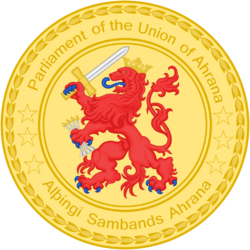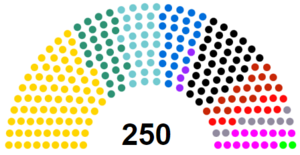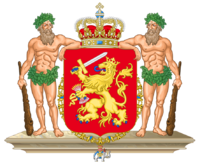Parliament of the Kingdom of Ahrana: Difference between revisions
No edit summary |
No edit summary |
||
| Line 14: | Line 14: | ||
| leader3_type = Speaker of the Assembly | | leader3_type = Speaker of the Assembly | ||
| leader3 = Karl Karlson | | leader3 = Karl Karlson | ||
| seats = | | seats = 250<br/> Consisting of | ||
* | * 250 Seats in the Assembly of Representatives | ||
| house1 = Assembly of Representatives | | house1 = Assembly of Representatives | ||
| house2 = | | house2 = | ||
| Line 25: | Line 25: | ||
| structure2_alt = | | structure2_alt = | ||
| political_groups1 = '''Parties in Government''' | | political_groups1 = '''Parties in Government''' | ||
* {{color box|#FFD500}} Loyalist Party of Ahrana ( | * {{color box|#FFD500}} Loyalist Party of Ahrana (120) | ||
* {{color box|# | * {{color box|#2D9274}} Right-Wing Independents of Ahrana (10) | ||
* {{color box|#72CAD0}} Centrist Front of Ahrana (50) | |||
* {{color box|#006EDC}} Royalist Party of Uppsund in Ahrana (10) | |||
* {{color box|#72CAD0}} Centrist | * {{color box|#9A28FE}} Ducal Party of Elde in Ahrana (10) | ||
* {{color box|# | |||
* {{color box|# | |||
'''Parties of Opposition''' | '''Parties of Opposition''' | ||
* {{color box|#C82707}} Liberal Party of Ahrana (25) | |||
* {{color box|#C82707}} Liberal | * {{color box|#FF0B0B}} Left-Wing Independents of Ahrana (15) | ||
* {{color box|#FF0B0B}} | * {{color box|#918B9F}} Labour Party of Ahrana (10) | ||
* {{color box|#918B9F}} | |||
| committees1 = | | committees1 = | ||
| committees2 = | | committees2 = | ||
Revision as of 22:34, 23 January 2022
Parliament of the Kingdom of Ahrana | |
|---|---|
 | |
| Type | |
| Type | |
| Houses | Assembly of Represetatives |
| Leadership | |
Chancellor of the Kingdom of Ahrana | Liv Bjorkman |
Speaker of the Assembly | Karl Karlson |
| Structure | |
| Seats | 250 Consisting of
|
 | |
Assembly of Representatives political groups | Parties in Government
Parties of Opposition
|
| Elections | |
Assembly of Representatives voting system | Party-List PR |
Assembly of Representatives next election | 2023 |
| Meeting place | |
| Parliamentary Palace, St. Peterburi, Ahrana | |
| Constitution | |
| Constitution of the Third United Kingdom of Ahrana | |
The Parliament (Alþingi- Xaraian, Stortinget- Tatani, Folketing- Peterburish, Парламент- Ahran) is the National and Supreme Legislative Authority of the Kingdom of Ahrana. Since the founding of the Third United Kingdom of Ahrana the Parliament is a unicameral with 150 Members, elected proportionally for a Five Year Term that is renewable only three times in total.
The Constitutional Functions of the Parliament is detailed in the Constitution of the Third United Kingdom of Ahrana, as well with the internal workings of the Parliament itself can be found in the Constitution.
The Seat of the Parliament is the Parliamentary Palace in St. Peterburi in the Dukedom of Peterburi inside the United Kingdom of Ahrana. The current Parliament of Ahrana has its connections to the previous Parliaments from the Fist and Second United Kingdom of Ahrana, both of which were a instrument of the Royal Government and the Imperial Throne which makes this Parliament the first true independent Legislative in the History of the Royal Governments of Ahrana. It is the First Legislature in Ahranaian History to also be a Unicameral Legislature under a Royal Government.
History
The First Parliament of the Kingdom of Ahrana was created in 1025 by Queen Ann of Mishia when she created the first laws for a United Kingdom that was in use till the fall of the First Kingdom. The Parliament since the creation in 1025 was bicameral legislature in the style of what Queen Ann of Mishia called the Bench Style, this form was used till the fall of the Second United Kingdom of Ahrana. The Chambers of the early Parliament were the Chamber of Nobility and the Chamber of the Estates both acted as a secondary confirmation for the Monarch and passed all Royal Laws and Decrees into Law without debate as was their reasonability. The First Parliament held no real power and the same would go for the Parliament created under the beginning of the Second United Kingdom.
In 1972, the King of the Second United Kingdom of Ahrana, King Gustov XVI, relinquished huge amount authority to the Parliament of the Second United Kingdom of Ahrana thus granting the Legislature for the first time the ability to create a Government in the Name of the Monarch that was free to operate separately and govern the Kingdom as outlined in the New Constitution. This would continue to be the case in the future as the King would devolve more authority to the Legislature and the Executive Government making the Monarch a mere Ceremonial Figurehead that still retained some Authority but not like it was before.
Power and Structure
The Parliament of Ahrana performs the normal functions a legislature of a Parliamentary Democracy would. It enacts laws, amends the constitution and appoints a government. In most parliamentary democracies, the head of state commissions a politician to form a government in the name of the head of state in this case in the name of the Monarchs of Ahrana.
There are 17 Parliamentary Committees that have some Sub-Parliamentary Committees from those Committees.
- Civil Affairs
- The Constitution
- Cultural Affairs
- Defense
- Education
- Environment and Agriculture
- Finance
- Foreign Affairs
- Internal Affairs
- Health and Welfare
- Industry and Trade
- Justice
- Labour Market
- Social Insurance
- Taxation
- Transport and Communications
- Joint Foreign Affairs and Defense
Membership
Since the creation of the Parliament of the Third Untied Kingdom of Ahrana the number and percentage of women in the Legislature that being at least 96 Seats of the Parliament of Ahrana are held by women. The percentage of women in the Parliament is around 63%, which is possibly one of the highest percentage of women in any legislatures on Eurth.
Government
The Executive Government or commonly called the Presidium is headed by a Chancellor that is the person who heads the Party with the most seats in the Parliament who are asked to form a Government. The other seats of the Presidium can be given to people in the Parliament within the same party or the section that support the Government.
The Parliament may at any time hold a vote of no confidence in the Government, if the vote is unanimous of in favor if the no confidence then the Chancellor must step down and request the Monarchs to call for an election. However, the Monarchs are not required to uphold this Vote of No Confidence if they feel the Government has done a adequality job or if the time the vote has come is one during times of trouble or turbulence.
Political Parties
The Political Party Landscape is currently dominated by the Loyalist Party of Ahrana to which the majority of all Government Offices are held by Members or People with affiliation with that Party. To form a political party one must register the party along with its party platform with the Electoral Commission of the Kingdom two months before the General Election, to remain a political party the organization must have gained at least 1% of the votes in the General Election if not gained then the party is declared a null and void political organization. The Regional Legislatures also must follow the same structure and rules regarding political parties.
Elections
Elections for the Parliament of Ahrana are held every Five years with each seat of the Parliament up for election or unless there is a Vote of No Confidence held in regards to the Government. The elections are to be free and fair and by secret ballet as per the Constitution. All Citizens of the age eighteen and older and without and Federal Convictions within the last ten years may vote for the Members of Parliament.
The Kingdom of Ahrana is divided up into regions with there being seven Federal Regions that are divided up into Provisional Districts that elected members to the Parliament of Ahrana. The elections on done using the Party-List Proportional Representation method. During the Elections the Party with the most Seats will be then nominated by the Parliament to be elected as Chancellor by the People in a separate election then after which they must petition the Monarchs to form a Government in their Name.
